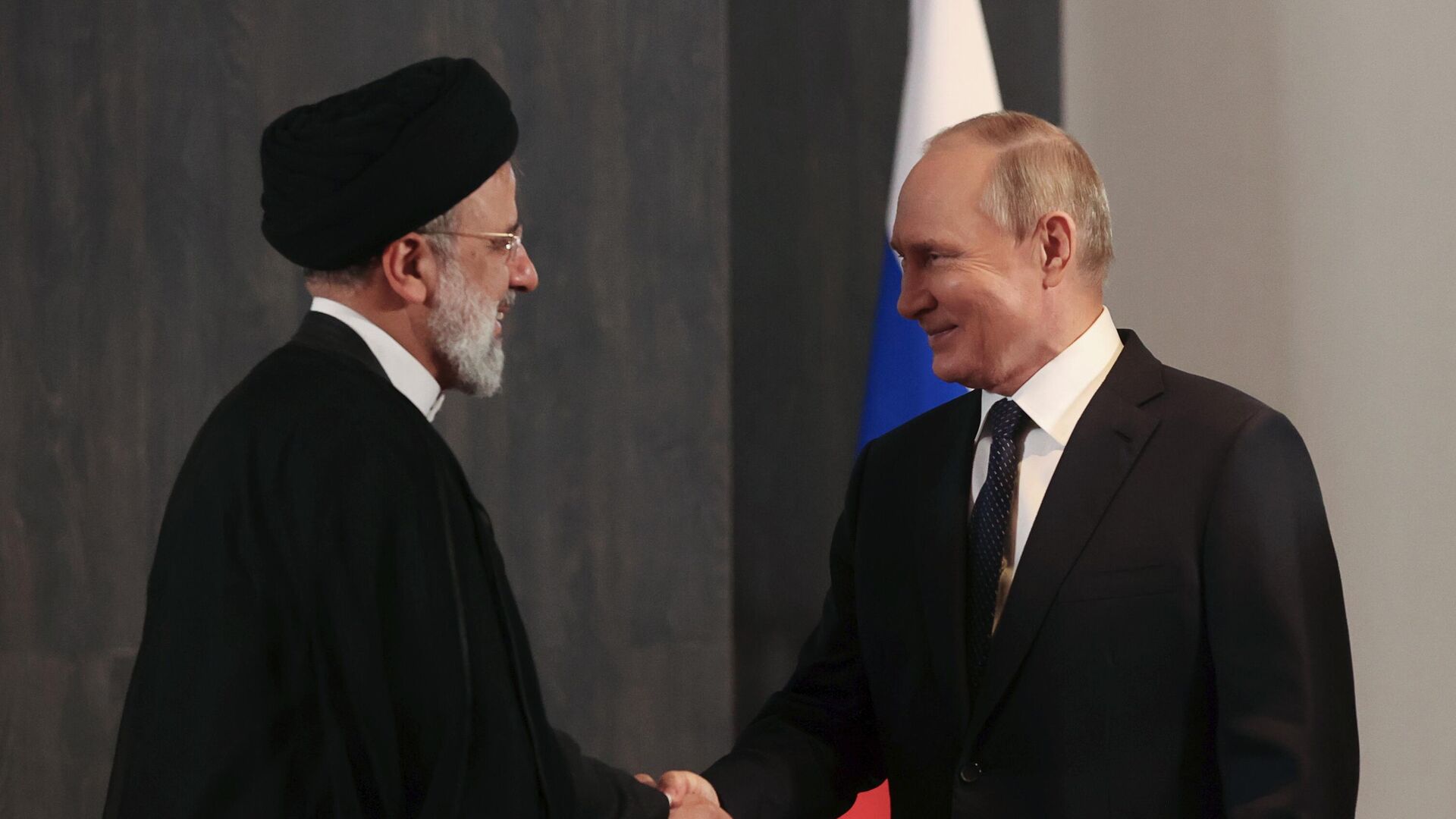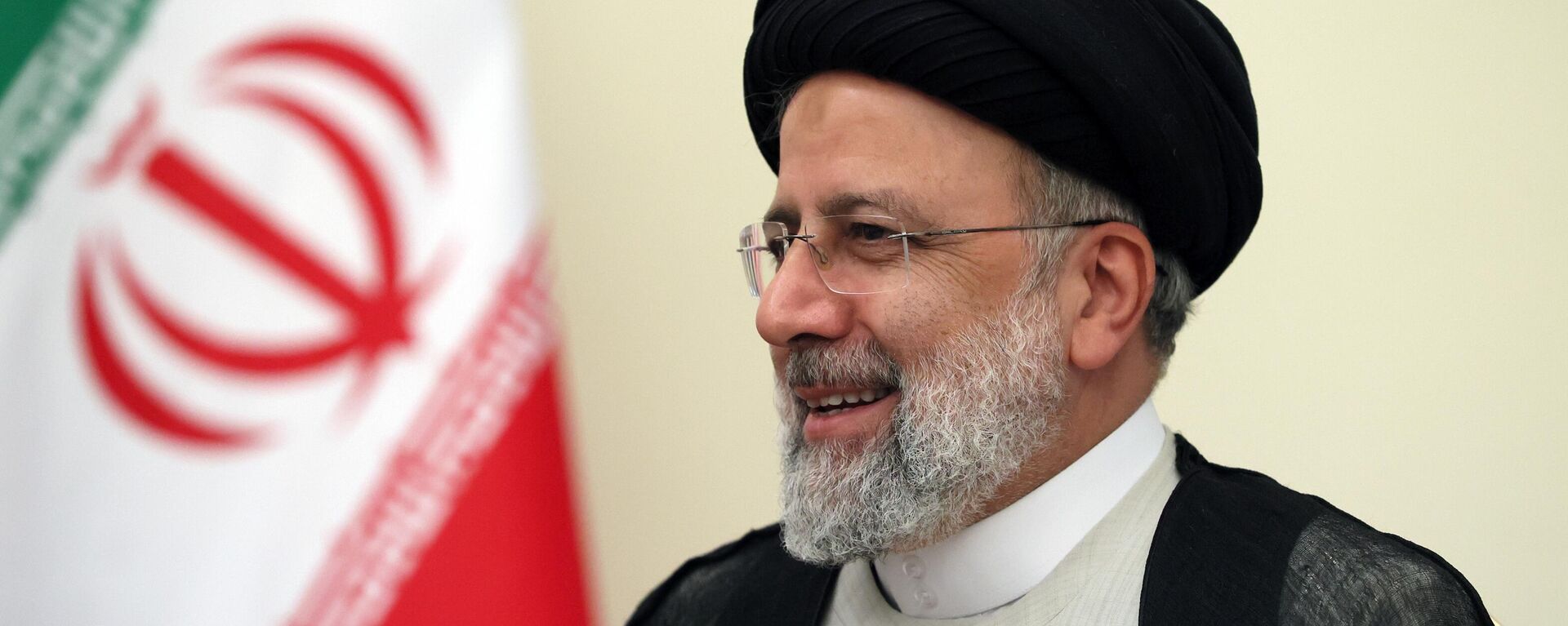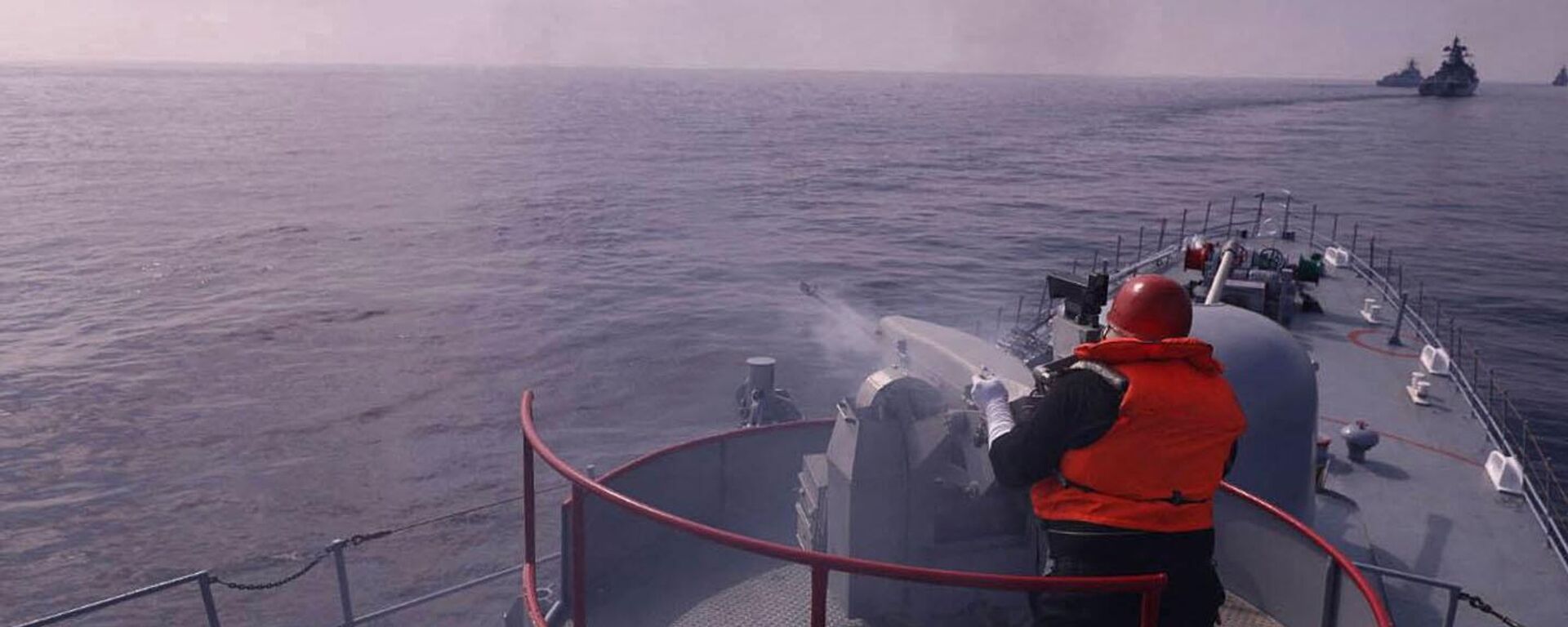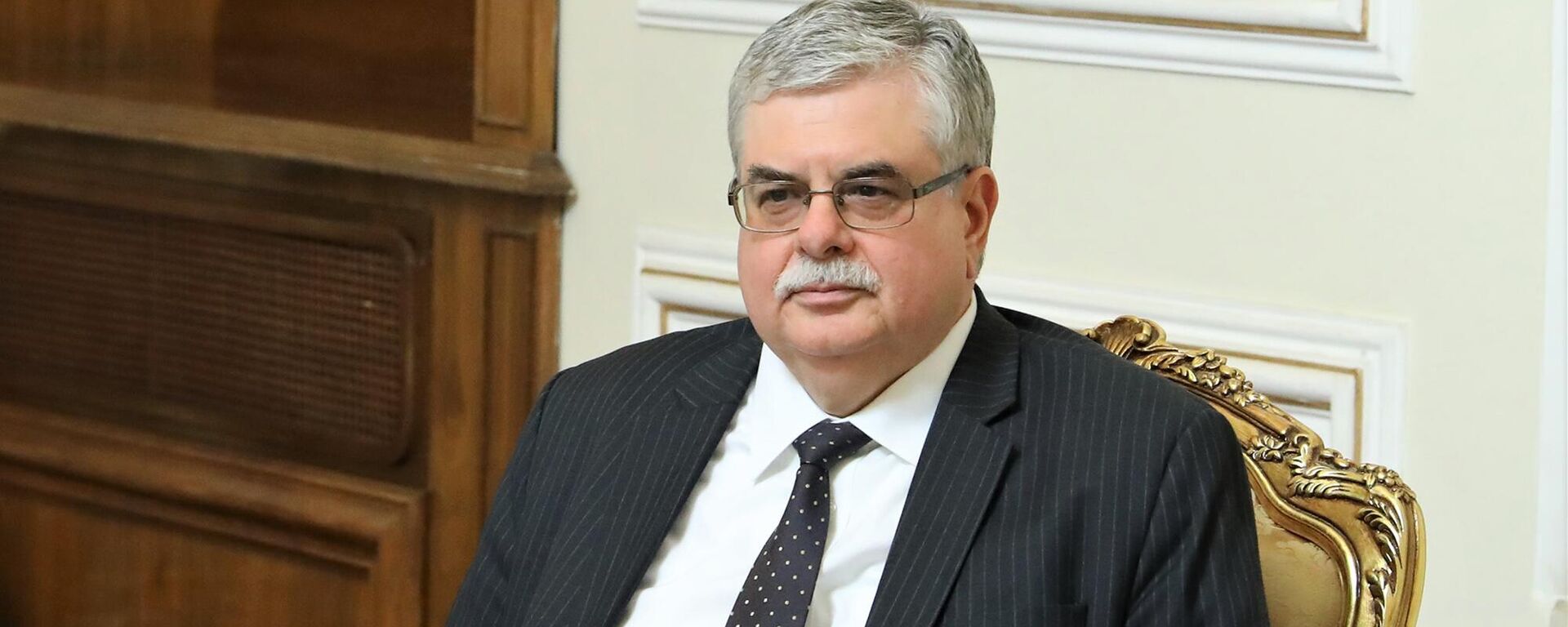https://sputnikglobe.com/20230515/russian-iranian-axis-threatens-american-empire---top-dc-think-tank-1110381912.html
'Russian-Iranian Axis' Threatens American Empire - Top DC Think Tank
'Russian-Iranian Axis' Threatens American Empire - Top DC Think Tank
Sputnik International
Russia and Iran have enjoyed warm, strategic cooperation for decades, building on ties forged over the course of more than 500 years, when the Grand Duchy of Moscow and the Persian Empire first established relations. The countries plan to sign a new strategic cooperation agreement in the near future.
2023-05-15T15:35+0000
2023-05-15T15:35+0000
2023-05-15T15:35+0000
world
iran
russia
washington
brics
white house
us
cooperation
global power
geopolitics
https://cdn1.img.sputnikglobe.com/img/07e6/09/0f/1100802821_0:0:3013:1696_1920x0_80_0_0_7ca58452d112fb4e04c9ac7227475a19.jpg
The US must do something to counter a "growing Iran-Russia axis" before it wreaks havoc on and further "undermines American interests in Europe, Eurasia, and the Middle East," a pair of scholars from the Heritage Foundation – a leading Washington, DC-based think tank, have warned.According to Heritage's Middle Eastern affairs observer James Phillips and weapons of mass destruction and proliferation expert Peter Brookes, the West’s efforts to "isolate" Russia and Iran and to sanction them into submission haven’t borne their expected fruit, with the two countries not only ramping up security and defense cooperation, but cooperating economically to sabotage Western restrictions.The scholars blasted the Biden administration for failing to "sufficiently address" the "ballooning alliance between Iran and Russia," and for "failing" to "deter or contain the aggressive foreign policy of either."Steps the White House should take are (you guessed it) more sanctions – including a formal US renunciation of the 2015 Iran nuclear agreement and a return to a Trump-era policy of "Maximum Pressure," and a crackdown on sanctions evasion, including restrictions against any countries or other third parties deemed to "facilitate sanctions evasion."The researchers propose efforts to strengthen US and Middle Eastern anti-Iran drone and missile defenses, and measures to sabotage Iran's drone-making capabilities by putting additional restrictions on microchips (the value of such restrictions is questionable, since the Islamic Republic has an extensive domestic defense electronics sector, and extensive cooperation with E-giant China).Finally, Phillips and Brookes want Washington to ramp up US oil and gas exports abroad to reduce global demand on Russian and Iranian supplies.The scholars warn that Washington and its allies must take steps "urgently" to "undermine and counter the anti-American Russian-Iranian axis," and say that failing to do so "will only lead to more international instability, including in the war in Ukraine."The Heritage researchers’ recommendations are aggressive, even from the standpoint of the influential Republican-leaning think tank’s typical recommendations – which have included proposals to use diplomacy, rather than restrictions, penalties and bullying, to divide America’s geopolitical adversaries. It’s not immediately clear how more pressure could undermine the Russian-Iranian partnership, instead of bringing the two countries even closer together, both at a bilateral level and through cooperation platforms such as the Shanghai Cooperation Organization and BRICS.Russian-Iranian PartnershipRussia and Iran are in the process of finalizing a new draft comprehensive cooperation agreement on bilateral strategic partnership, taking into account the recent rebalancing of power that took place in the Middle East following the historic normalization of ties between Iran and traditional US client Saudi Arabia.The two countries have maintained diplomatic relations for over five centuries, with ties maintained and strengthened through the rise and fall of empires, revolutions and new political and economic systems in both nations.Amid the escalation of the long-running Donbass crisis into a full-blown Russia-NATO proxy conflict in 2022, Russian-Iranian trade grew by 15 percent, and the two countries signed a series of agreements in areas including energy, defense and banking.The US and its allies have sought to undermine Russia-Iran cooperation, accusing the Islamic Republic of supporting Moscow militarily in Ukraine, and of providing Russia with assistance in the evasion of sanctions. Tehran has dismissed these allegations, emphasizing that ties between Iran and its northern neighbor are “not directed against any third state.”
https://sputnikglobe.com/20230504/raisis-visit-to-syria-heralds-failure-of-wests-mideast-policy-1110097905.html
https://sputnikglobe.com/20230429/iran-ready-to-ramp-up-joint-drills-with-china-to-challenge-us-unipolar-world-1109956249.html
https://sputnikglobe.com/20230320/russias-iran-envoy-to-sputnik-moscow-tehran-relations-have-acquired-a-strategic-character-1108613856.html
iran
russia
washington
Sputnik International
feedback@sputniknews.com
+74956456601
MIA „Rossiya Segodnya“
2023
News
en_EN
Sputnik International
feedback@sputniknews.com
+74956456601
MIA „Rossiya Segodnya“
Sputnik International
feedback@sputniknews.com
+74956456601
MIA „Rossiya Segodnya“
russia, iran, united states, us, us empire, empire, cooperation, undermine
russia, iran, united states, us, us empire, empire, cooperation, undermine
'Russian-Iranian Axis' Threatens American Empire - Top DC Think Tank
Russia and Iran have enjoyed warm, strategic cooperation for decades, building on ties forged over the course of more than 500 years, when the Grand Duchy of Moscow and the Persian Empire first established relations. The countries plan to sign a new strategic cooperation agreement in the near future.
The US must do something to counter a "growing Iran-Russia axis" before it wreaks havoc on and further "undermines American interests in Europe, Eurasia, and the Middle East," a pair of scholars from the Heritage Foundation – a leading Washington, DC-based think tank, have warned.
According to Heritage's Middle Eastern affairs observer James Phillips and weapons of mass destruction and proliferation expert Peter Brookes, the West’s efforts to "isolate" Russia and Iran and to sanction them into submission
haven’t borne their expected fruit, with the two countries not only ramping up security and defense cooperation, but cooperating economically to sabotage Western restrictions.
The scholars blasted the Biden administration for failing to "sufficiently address" the "ballooning alliance between Iran and Russia," and for "failing" to "deter or contain the aggressive foreign policy of either."
"As such, Washington must develop an overarching framework for undermining the power of both, penalizing dangerous cooperation between the two, and ratcheting up stress on their bilateral ties," Phillips and Brookes recommend.
Steps the White House should take are (you guessed it) more sanctions – including a formal US renunciation of the 2015 Iran nuclear agreement and a return to a Trump-era policy of "Maximum Pressure," and a crackdown on sanctions evasion, including restrictions against any countries or other third parties deemed to "facilitate sanctions evasion."
The researchers propose efforts to strengthen US and Middle Eastern anti-Iran drone and missile defenses, and measures to sabotage Iran's drone-making capabilities by putting additional restrictions on microchips (the value of such restrictions is questionable, since the Islamic Republic has an extensive domestic defense electronics sector, and extensive cooperation with E-giant China).
Finally, Phillips and Brookes want Washington to ramp up US oil and gas exports abroad to reduce global demand on Russian and Iranian supplies.
The consequences of failing to act are multiple and severe, from the foreign policy hawks' standpoint. For one thing, they write, "the strengthening alliance between Iran and Russia already has been a contributing factor behind the recent Chinese-brokered détente behind Iran and Saudi Arabia, as well as the end of Arab efforts to isolate Syria’s Assad regime, with Iran and Russia[‘s] support." (Regional normalization and peace deals are bad, apparently, particularly if they don't involve the US).
The scholars warn that Washington and its allies must take steps "urgently" to "undermine and counter the anti-American Russian-Iranian axis," and say that failing to do so "will only lead to more international instability, including in the war in Ukraine."
The Heritage researchers’ recommendations are aggressive, even from the standpoint of the influential Republican-leaning think tank’s typical recommendations – which have included proposals to use diplomacy, rather than restrictions, penalties and bullying, to divide America’s geopolitical adversaries. It’s not immediately clear how more pressure could undermine the Russian-Iranian partnership, instead of bringing the two countries even closer together, both at a bilateral level and through cooperation platforms such as the Shanghai Cooperation Organization and BRICS.
Russian-Iranian Partnership
Russia and Iran are in the process of finalizing a new draft comprehensive cooperation agreement on bilateral strategic partnership, taking into account the recent rebalancing of power that took place in the Middle East following the historic normalization of ties between Iran and traditional US client Saudi Arabia.
The two countries have maintained diplomatic relations for over five centuries, with ties maintained and strengthened through the rise and fall of empires, revolutions and new political and economic systems in both nations.
Amid the escalation of the long-running Donbass crisis into a full-blown Russia-NATO proxy conflict in 2022, Russian-Iranian trade grew by 15 percent, and the two countries
signed a series of agreements in areas including energy, defense and banking.
The US and its allies have sought to undermine Russia-Iran cooperation, accusing the Islamic Republic of supporting Moscow militarily in Ukraine, and of providing Russia with assistance in the evasion of sanctions. Tehran has
dismissed these allegations, emphasizing that ties between Iran and its northern neighbor are “not directed against any third state.”





